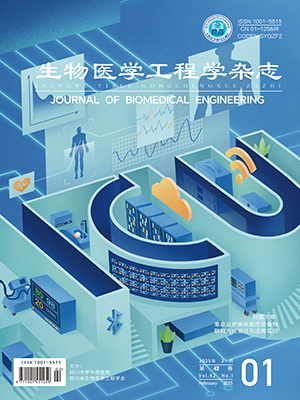| 1. |
Yu M W, Lin C L, Liu C J, et al. Influence of metabolic risk factors on risk of hepatocellular carcinoma and liver-related death in men with chronic hepatitis B: a large cohort study. Gastroenterology, 2017, 153(4): 1006-1017.
|
| 2. |
Bray F, Ferlay J, Soerjomataram I, et al. Global cancer statistics 2018: GLOBOCAN estimates of incidence and mortality worldwide for 36 cancers in 185 countries. CA Cancer J Clin, 2018, 68(6): 394-424.
|
| 3. |
Zhai W, Lim T K, Zhang T, et al. The spatial organization of intra-tumour heterogeneity and evolutionary trajectories of metastases in hepatocellular carcinoma. Nat Commun, 2017, 8(1): 1-9.
|
| 4. |
Casak S J, Donoghue M, Fashoyin-Aje L, et al. FDA approval summary: atezolizumab plus bevacizumab for the treatment of patients with advanced unresectable or metastatic hepatocellular carcinoma. Clin Cancer Res, 2020, 27(7): 1836-1841.
|
| 5. |
Nawy T. Tumor genetic analysis from single-cell RNA-seq data. Nat Methods, 2018, 15(8): 571.
|
| 6. |
Dikic I, Elazar Z. Mechanism and medical implications of mammalian autophagy. Nat Rev Mol Cell Biol, 2018, 19(6): 349-364.
|
| 7. |
Perera R M, Stoykova S, Nicolay B N, et al. Transcriptional control of autophagy-lysosome function drives pancreatic cancer metabolism. Nature, 2015, 524(7565): 361-365.
|
| 8. |
Rao S, Tortola L, Perlot T, et al. A dual role for autophagy in a murine model of lung cancer. Nat Commun, 2014, 5(1): 1-15.
|
| 9. |
Yang A, Rajeshkumar N V, Wang X, et al. Autophagy is critical for pancreatic tumor growth and progression in tumors with p53 alterations. Cancer Discov, 2014, 4(8): 905-913.
|
| 10. |
Yang S, Yang L, Li X, et al. New insights into autophagy in hepatocellular carcinoma: mechanisms and therapeutic strategies. Am J Cancer Res, 2019, 9(7): 1329-1353.
|
| 11. |
Wang Y, Liu X, Guan G, et al. A risk classification system with five-gene for survival prediction of glioblastoma patients. Front Neurol, 2019, 10: 745.
|
| 12. |
Yu C, Wang L, Lv B, et al. TMEM74, a lysosome and autophagosome protein, regulates autophagy. Biochem Biophys Res Commun, 2008, 369(2): 622-629.
|
| 13. |
Sun Y, Li Q, Zhang J, et al. Autophagy regulatory molecule, TMEM74, interacts with BIK and inhibits BIK-induced apoptosis. Cell Signal, 2017, 36: 34-41.
|
| 14. |
Sun Y, Chen Y, Zhang J, et al. TMEM74 promotes tumor cell survival by inducing autophagy via interactions with ATG16L1 and ATG9A. Cell Death Dis, 2017, 8(8): e3031.
|
| 15. |
Hagenbuchner J, Kiechl-kohlendorfer U, Obexer P, et al. BIRC5/Survivin as a target for glycolysis inhibition in high-stage neuroblastoma. Oncogene, 2016, 35(16): 2052-2061.
|
| 16. |
Lin T Y, Chan H H, Chen S H, et al. BIRC5/Survivin is a novel ATG12-ATG5 conjugate interactor and an autophagy-induced DNA damage suppressor in human cancer and mouse embryonic fibroblast cells. Autophagy, 2020, 16(7): 1296-1313.
|
| 17. |
Liu S H, Hong Y, Markowiak S, et al. BIRC5 is a target for molecular imaging and detection of human pancreatic cancer. Cancer Lett, 2019, 457: 10-19.
|
| 18. |
Wang L, Huang J, Jiang M, et al. Survivin (BIRC5) cell cycle computational network in human no-tumor hepatitis/cirrhosis and hepatocellular carcinoma transformation. J Cell Biochem, 2011, 112(5): 1286-1294.
|
| 19. |
Denk H, Stumptner C, Abuja P M, et al. Sequestosome 1/p62-related pathways as therapeutic targets in hepatocellular carcinoma. Expert Opin Ther Targets, 2019, 23(5): 393-406.
|
| 20. |
Umemura A, He F, Taniguchi K, et al. p62, upregulated during preneoplasia, induces hepatocellular carcinogenesis by maintaining survival of stressed HCC-initiating cells. Cancer Cell, 2016, 29(6): 935-948.
|
| 21. |
Saito T, Ichimura Y, Taguchi K, et al. p62/Sqstm1 promotes malignancy of HCV-positive hepatocellular carcinoma through Nrf2-dependent metabolic reprogramming. Nat Commun, 2016, 7: 12030.
|
| 22. |
Duran A, Hernandez E D, Reina-campos M, et al. p62/SQSTM1 by binding to vitamin D receptor inhibits hepatic stellate cell activity, fibrosis, and liver cancer. Cancer Cell, 2016, 30(4): 595-609.
|
| 23. |
Vander Molen J, Frisse L M, Fullerton S M, et al. Population genetics of CAPN10 and GPR35: implications for the evolution of type 2 diabetes variants. Am J Hum Genet, 2005, 76(4): 548-560.
|
| 24. |
Horikawa Y, Oda N, Cox N J, et al. Genetic variation in the gene encoding calpain-10 is associated with type 2 diabetes mellitus. Nat Genet, 2000, 26(2): 163-175.
|
| 25. |
Hatta T, Iemura S I, Ohishi T, et al. Calpain-10 regulates actin dynamics by proteolysis of microtubule-associated protein 1B. Sci Rep, 2018, 8(1): 16756.
|
| 26. |
Turner M D, Fulcher F K, Jones C V, et al. Calpain facilitates actin reorganization during glucose-stimulated insulin secretion. Biochem Biophys Res Commun, 2007, 352(3): 650-655.
|
| 27. |
Moreno-Luna R, Abrante A, Esteban F, et al. Calpain 10 gene and laryngeal cancer: a survival analysis. Head Neck, 2011, 33(1): 72-76.
|
| 28. |
Frances C P, Conde M C, Saez M E, et al. Identification of a protective haplogenotype within CAPN10 gene influencing colorectal cancer susceptibility. J Gastroenterol Hepatol, 2007, 22(12): 2298-2302.
|
| 29. |
Chan D, Tsoi M Y, Liu C D, et al. Oncogene GAEC1 regulates CAPN10 expression which predicts survival in esophageal squamous cell carcinoma. World J Gastroenterol, 2013, 19(18): 2772-2780.
|
| 30. |
Yang Z, Zhuang L, Szatmary P, et al. Upregulation of heat shock proteins (HSPA12A, HSP90B1, HSPA4, HSPA5 and HSPA6) in tumour tissues is associated with poor outcomes from HBV-related early-stage hepatocellular carcinoma. Int J Med Sci, 2015, 12(3): 256-263.
|
| 31. |
Wang C, Zhang Y, Guo K, et al. Heat shock proteins in hepatocellular carcinoma: Molecular mechanism and therapeutic potential. Int J Cancer, 2016, 138(8): 1824-1834.
|
| 32. |
Matsushima-Nishiwaki R, Toyoda H, Takamatsu R, et al. Heat shock protein 22 (HSPB8) reduces the migration of hepatocellular carcinoma cells through the suppression of the phosphoinositide 3-kinase (PI3K)/AKT pathway. Biochim Biophys Acta Mol Basis Dis, 2017, 1863(6): 1629-1639.
|




